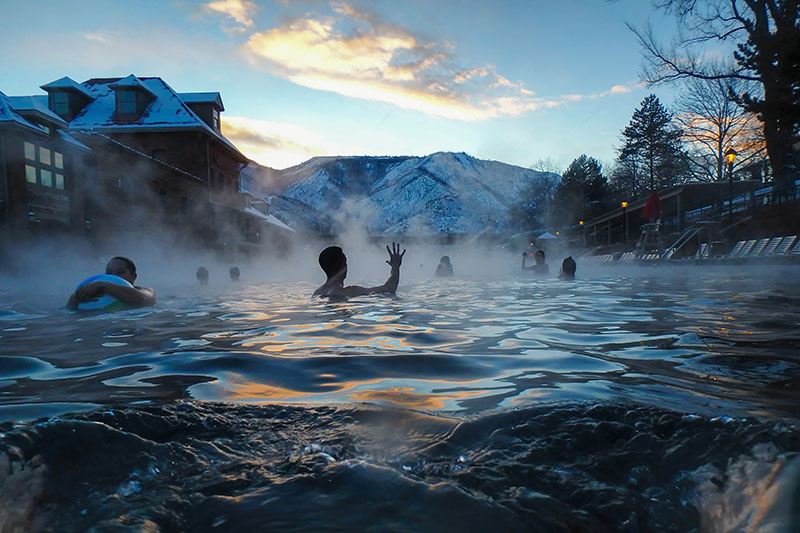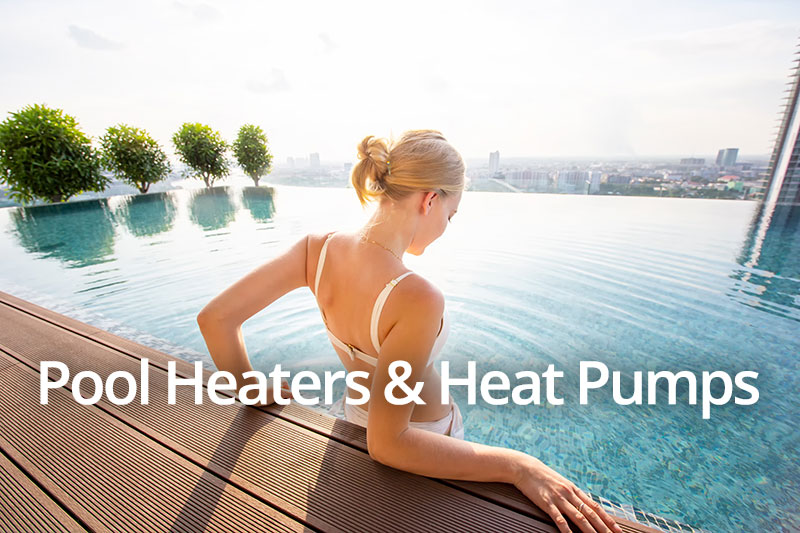The winter months are the best time for cold outdoor activities, but that shouldn’t stop you from using your pool for some aquatic fun. A pool heater can help you get the most out of your swimming pool, but the $64,000 question remains: what type of pool heater will you get? This article will look at the Gas vs. Electric Pool Heaters, including the benefits, costs, and drawbacks.
Without further ado, let’s dive in! (Pun intended)
Pool Heaters – Which one is best for your pool?
Natural gas or propane pool heaters are the most common options for heating swimming pools. The type of pool heater you choose will depend on your pool’s energy demands and size.
How a Gas Pool Heater Works
A pool heater consists of a combustion chamber that converts propane or natural gas into heat. This heat is conducted by coils inside the pump, allowing the water to pass through, heat up, and flow back into the pool. It is a continuous process that gradually raises the pool temperature to optimal levels.
Depending on the pool size, gas pool heaters can warm up your pool by around 1ºC per hour during the summer. In the winter, you’d likely need a pool cover to enjoy the best benefit from this heating type. Gas pool heaters are ideal for planned swimming sessions.
For instance, if you swim at a particular time each week, you can set it up so that it gets to your desired temperature by the time you’re ready to swim.
Gas pool heaters may not be as energy-efficient as their electric rivals.
Still, it is the ideal choice for facilities that require occasional heating. Gas pool heaters are sometimes difficult to install because the equipment often requires electrical and gas feeds.
Whatever you do, ensure you store flammable items, electronics, plastics, and chemicals a good distance away from the pool heater exhaust. You should also install heavy-duty PVC plumbing on the pool heater delivery side. Also, be aware that your pool may require remodeling to properly install your gas heater.
Gas pool heaters also come in two types, and these are:
1. Natural Gas: these pool heaters require a connection to a gas line and an expert installer. Natural gas heaters cost a lot more to install but have a longer-lasting lifespan.
2. Propane: Propane pool heaters require a small refillable gas canister to heat your pool. While cheaper than the natural gas heater, it is still more expensive than a heat pump.
Advantages of Gas Pool Heaters
1. Excellent for hot tubs: if you want to heat your hot tub or jacuzzi to high temperatures, propane or natural gas heaters are likely your best choice.
2. Ideal for cooler climates: pool heaters use the combustion chamber to create heat, making it the best choice for cooler temperatures to prevent overheating.
Disadvantages of Gas Pool Heaters
1. Not eco-friendly: pool heaters release emissions that contribute to global warming.
2. Expensive in the long term: The gas cost of a pool heater can spiral quickly, especially if the pool is used regularly.

Heat Pumps for Pools
Heat pumps heat your pool with electricity, unlike gas heaters that create heat through fuel. Heat pumps are one of the most popular methods of heating a swimming pool and are preferred choices for competitions and swimming meets.
How a Heat Pump Works
Heat pumps draw heat from the ambient air, passing over the evaporator coil inside the heat pump. The pump contains refrigerant, which absorbs this heat and turns it into a gas. The gas continues to heat up as it passes through the heat condenser and compressor.
At the same time, the pool pump draws in water from the pool into the heat pump, where the water increases in temperature and flows back into the pool. This process continues in a cycle until the water is at optimum temperature.
Advantages of Heat Pumps for Pools
1. Ideal for warmer climates: The heat uses the surrounding air to heat the pool, which makes it an excellent choice for warm temperatures where the air is already warm.
2. Best for Regular use: A heat pump might not quickly heat your water when you’re in a hurry, but it is the best choice for keeping your pool at a steady temperature. The heat pump is the proffered option for people who use their pool regularly.
Disadvantages of Heat Pumps for Pools
1. Slow heat: Heat pumps warm up your pool at a slower rate than a gas heater. For this reason, it isn’t the best solution for your hot tub or jacuzzi.
2. Not ideal for cooler climates: heat pumps use the surrounding air to heat your pool, making it less desirable for frigid climates.
Gas vs. Electric Pool Heater Cost
A gas heater will set you back $1500 to $2500, and that’s only the cost of the equipment. Installation and incidental expenses can cost you an extra $500 to $2000. The gas heater price is generally lower, but the usage and maintenance costs are more expensive in the long term.
On the other hand, the electric heat pump price ranges between $2500 and $3500 with an additional $1000 installation fee. While it is more expensive equipment, the usage and maintenance costs are more affordable in the long run. The average gas heater operation cost is $200 to $400 monthly. In comparison, an electric heat pump costs around $100 to $200 per month to operate.
Does It Cost More to Heat a Pool With Gas or Electricity?
It isn’t clear cut which method costs more money. The pool heating cost will depend on the size of your swimming pool and how frequently you take a dip.
In addition, electricity and gas prices are subject to change, affecting the cost of use. If you own a large pool, you can remodel it to make it smaller and save heating costs in the long term.
Is a Gas Pool Heater Worth It?
Gas pool heaters are the best for frequent travelers or owners who prefer to use their pool every once in a while. Depending on the cost of your electric bill, a gas heater can save you money and lasts longer.
What Is the Most Efficient Way to Heat a Swimming Pool?
According to the Department of Energy, The most energy-efficient way to heat your pool is with a heat pump, particularly for milder climates. Consider buying a heat pump with a scroll compressor against the reciprocal compressors available in many heat pumps for more efficiency.
Heat Pump vs. Gas Pool Heater Considerations
It can be hard to pick between a gas heater and an electric pump for your pool needs. However, it would be best to consider the following options before deciding one way or the other.
- Short-term price and long-term cost
- Energy efficiency
- Heat consistency
- Installation, maintenance, usage, and repair costs
If you still cannot decide which pool heating equipment to buy, consider the frequency of use and whether you’d need to winterize your pool. Also, find out the average temperature in your location and whether you plan on using your pool during the cooler months.
What Is the Best Heat Pump for the Swimming Pool?
There isn’t the best heat pump for a swimming pool because the type of pump you need will depend on many factors, including your electric bill costs and frequency of usage.
However, before you select a heat pump, you need to consider the following:
- Size
- Efficiency
- Costs
It is recommended you consult the services of a trained professional for expert analysis on your pool to know the pool heater size. It takes skill to size a heat pump pool heater because you need to measure the pool’s surface area, including the difference between the pool and average air temperature.
Other factors that may affect the heat pump size include cool night temperatures, wind exposure, and humidity levels. If your pool is in a location with higher-than-normal wind speeds, extremely cold nights, and low humidity, chances are you’d need a large heater.
Heat Pump heaters are graded by their horsepower and BTU. Common sizes include:
- 3.5hp/75,000 BTU
- 5hp/100,000 BTU
- 6hp/125000 BTU

Which Swimming Pool Heater Is the Best for the Cold Climate?
Natural gas heaters are the best for cold climates because they don’t depend on ambient air temperature. These heaters have an output between 75,000 BTU to 450,000 BTU.
Follow these steps to determine the approximate heater/ heat pump size for your outdoor pool:
- Determine your optimum pool temperature
- Ascertain the temperature average for the coldest month of pool use
- Subtract this average from the optimum pool temperature to determine the required temperature rise
- Calculate the square feet of the pool area.
- Use the formula below to know the heater’s BTU/hour output performance.
Pool area x Temperature rise x 12. The best gas heaters have a high energy efficiency rate between 85% to 95% efficiency.
For instance, a 70% efficient heater will generate $70 worth of heat per $100 of fuel burn.
Frequently Asked Questions
If you have further questions, below are the answers to some FAQs about pool heaters and heat pumps.
How long do pool heaters last?
A gas pool heater or heat pump is durable equipment that can last 7 to 10 years. You can make this equipment last for longer with regular maintenance and repairs.
Do pool heat pumps use a lot of electricity?
Heat pumps cost less than gas heaters and consume approximately 5 kilowatts per hour for a 100,000 BTU heat pump. The national power average is standing at 13cents for each kilowatt-hour.
Can I leave my pool heater overnight?
It would be best if you never left your pool heater switched on overnight, unless you have money to burn. If you want to leave your pool heater on overnight, ensure you do so with a pool cover to retain the heat and save costs.
Contact Willsha Pools
Heaters and heat pumps are the best solutions for enjoying your pool in all conditions. But when you are considering which one is best.. You’ll need to consider your heating needs, pool size, location, and budget. If you live in a chillier climate, the natural gas or propane heater is the best option.
However, if you want long-term savings, a heat pump might be what you need. It is an excellent idea to use a larger pool heater because it heats up the water faster and doesn’t lose as much heat in the process. Large pool heaters and heat pumps require less energy to raise the pool temperature and are more convenient.
If you are considering installing a new pool heater or pool pump, contact the experts at Willsha Pools.

